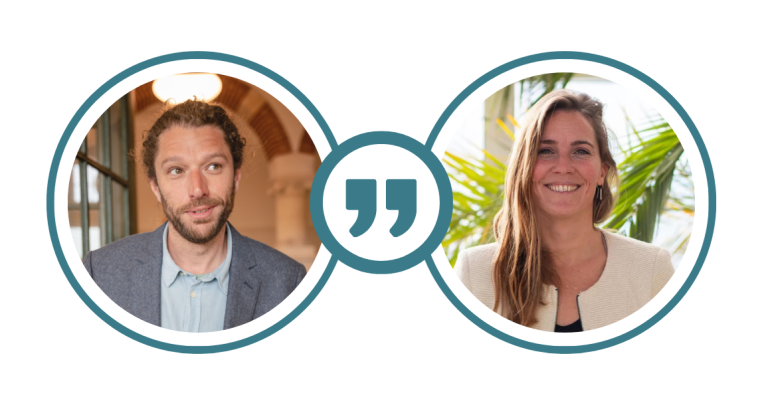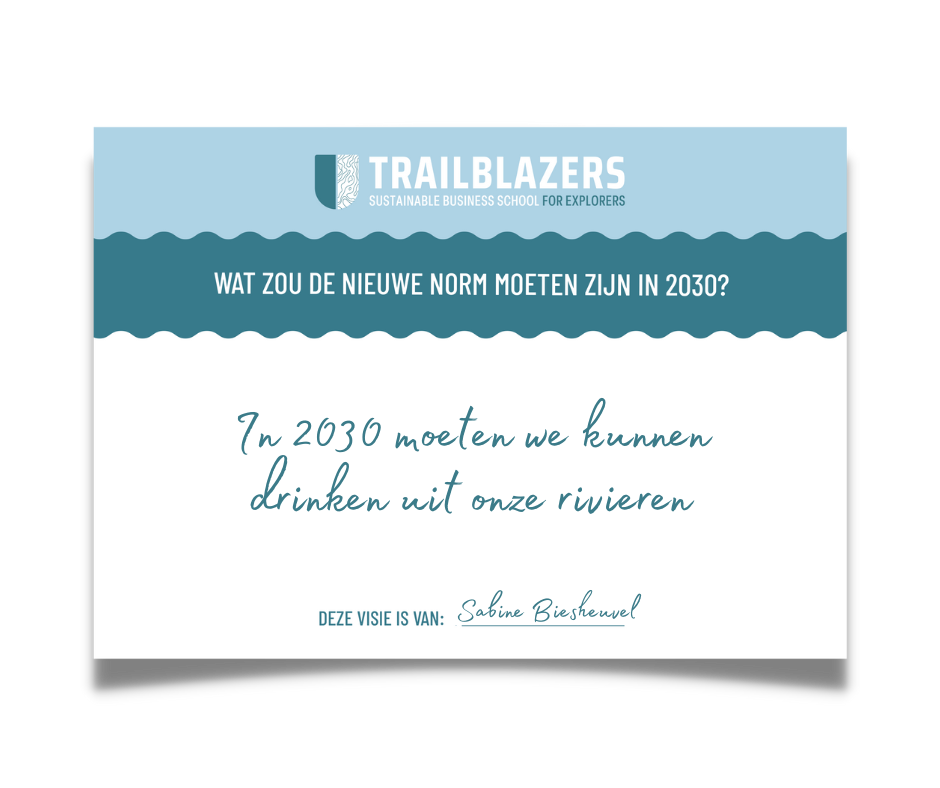
SERIES FRONTRUNNERS & FRONTIER EXPLORERS • EPISODE 7
In conversation with Sabine Biesheuvel, co-founder and director of Blue City
How do experts view entrepreneurship in times of transition? Trailblazers talks to frontrunners and frontier explorers to find out. This time we spoke to Sabine Biesheuvel, co-founder and director of Blue City. We sat down at a unique location: the old Tropicana swimming pool in Rotterdam, where Blue City is located today. Sabine tells us more about the very beginning of Blue City, her view on circularity, what essential qualities are needed to be a driver of change and more.
READ THE FULL INTERVIEW
How did Blue City originated and when did you start this initiative?
"That's quite a process and it started with the spiritual fathers of Blue City, which are the guys behind Rotterdam. They had been anti-squatting in this building since 2013, and they were the ones who had the dream of an ecosystem. Eventually, they actually started speaking this out loud and gathered a group of people around them in 2015. I was one of them. And so a group was formed that actually bought the building in 2015. From then it really took off and we started working on the business plans. I was given all the space I needed by the start-up team and became the initiative's catalyst. Since then, I have always been involved with Blue City full-time."
What is happening here in Blue City?
"The core of Blue City is, 'we believe that through entrepreneurs we can accelerate the circular economy,'" he said. Here we help as many young companies and innovations as possible grow in a healthy way. Meanwhile, we are also increasingly helping existing companies with their circularity and business models. These two worlds are connected and we try to bring them together. What we find very important are tangible, concrete products. We are really into raw materials and physical products, so you are welcome here if you have a solid business plan towards the manufacturing industry. For example, it smells like seaweed in the basement one day or soaps the next, this depends if you just came by on a good day, haha."
What are entrepreneurs doing in Blue City? And what do you support these entrepreneurs in?
"Within the building, we have a production section. That's the piece downstairs and most of the building. There we have all kinds of companies that make circular products. So we have a beer brewer, for example, Vet & Lazy. They use a lot of residual electricity from Barendrecht and also use rainwater. But downstairs there is also BlueBocks, a company that makes sheet material from seaweed and for example Outlander Materials, they make edible films. So that's actually packaging material, but made from bio-waste.
We support entrepreneurs on all fronts. So we're trying to create a highway to the right agencies instead of a goat's path where you have to do everything yourself while also having 20,000 other things to fix. And within a circular business, there are always some themes that recur. For example, feedstock, meaning, "how do you get your materials?" is very important. But also the production process that comes after that, so the knowledge about process technology to make your product and production process as circular and sustainable as possible. Then you also have the financial aspect. You have to create a realistic financial model, but that is sometimes quite a challenge. You have to make assumptions about how you are going to do it, what your production process is going to cost, what the customer is going to pay for it and how that is going to develop. This means you also have to think about what kind of financing you need at what stage of the business. And you need customer contracts and a network. When the market suddenly starts to grow, you have to have commitment about the price that customers want to buy in order to get the financiers to come along. So we also try to build a network of parties who can assess this well and have gone through these processes before."
"We are trying to create a highway to the right agencies instead of a goat trail where entrepreneurs have to do everything themselves."
When you look at the entrepreneurs at Blue City; what do you see as essential qualities to play the role as a booster?
"It is first good to specify that in my mind there is no such thing as an entrepreneur. You do have very entrepreneurial types. But if you don't gather the right people around you very quickly, you're not going to last long. If you see all the major themes of just now, that would mean it's all on the entrepreneur's shoulder. And that's just not going to happen. So as an entrepreneur, at some point it's very good to realize what you're good at and where your strengths lie. From there you can go on to build and gather a team around you. If your team is diverse enough to handle all the challenges, you can go a long way. So you need someone with technological knowledge, with financial knowledge, with commercial knowledge and knows how to build a network, but also someone who communicates what the company stands for and a target group-oriented team member. Sometimes this can be combined in one person, but often not. That would be very unhealthy, because then you end up being all alone in your business. So I think you really have to think in teams."
With Blue City, you are working on circularity and have a vision for a blue economy; what do those terms mean to you?
"Yes, ultimately both are about the healthy relationship of our economy with our ecosystems. But a blue economy differs in that it looks more broadly at nature in general and takes some principles from natural systems to also say, 'this is how you could and should organize yourself.' For example, nature never pulls raw materials from far away to support a particular mechanism, so everything is seasonal and local. And again, what you see in this is that waste for one, is a resource for another. So we are experimenting with these principles and looking at how we can shape the blue economy at Blue City."
You've been active in this field for a while now: have you seen change or is there still much to be gained?
"No, it's certainly true that more and more people understand that resources are precious. But I also think it is still far too easy to finance in software and too little is done in hardware. That also says something about the risk models that financiers have to deal with and that there is still a very easy way of thinking about the availability of materials. And often there is also a distorted view of how well things are going in the domain. In the early stages, the budget and resources are there, but when a product goes to a demo plant and then becomes commercial, things are not going well yet."
"I believe the topic of 'how we handle our resources' should be on the agenda and should stay there. It sometimes slips away easily and we are quickly distracted by all sorts of other symptoms."
Besides Blue City, do you do a lot of other things? Tell me?
"Yes, I do a lot of things. That's also a golden tip: learn to say no. But among other things, I chair the Rotterdam Climate Approach and sit on the SME Sustainable and Circular Committee. And I do all that because I really believe that the subject of 'how we deal with our raw materials' should be on the agenda and should stay there. It sometimes slips away easily and we are quickly distracted by all sorts of other symptoms. I very much believe in building networks and forging partnerships that are of value to our entrepreneurs. At Blue City, helping entrepreneurs will always be central, but that only happens when Blue City has a rock-solid network. So that's another reason."
What would you give entrepreneurs or professionals if they want to do something in the area of sustainability but don't know where to start?
"I think the most important thing is to have a coalition of willing to create around you. And that can be within your company, but sometimes in your industry. And: make sure you have mandate. So make sure you don't feel responsible for things that are beyond your control. Because then you burn out completely. If you don't get that settled in the environment, you have to go away and stop what you're doing. There is nothing more irritating or exhausting when you see that things need to be different within an environment, but you don't get the mandate to take care of it. And, of course, at some point you have to look at yourself with self-reflection. You have to remain realistic in what you can change, because it's only a small piece. And also keep laughing at yourself a little bit."
"Make sure you don't feel responsible for things beyond your control, because you'll burn out completely."
Where will Blue City be in five years?
"Whew, I hope we will have really finished the property by then. There is a lot of renovation and we have now remodeled a little over half of the property. But a lot of pieces still need to be built as well. And I want to triple our business development projects, so a lot more businesses, maybe in different places and in the big industries. And finally, in five years, I hope to have a really good, solid team. We're very action- and impact-driven, and we've persevered tremendously over the last few years and gotten a lot done. So taking good care of our people is a key focus. There are currently 23 of us and we have 18 vacancies open. So if any readers want to join us, at Blue City, you can, haha."
What should be the social norm in 2030?
"Well you have an activist, someone I know, who said, 'you should be able to drink from our rivers then.' As an indicator that you have a healthy ecosystem and a healthy economy. And that's very tangible. So if we're well on our way to drinkable rivers and healthy soil, you have a huge indicator that we're doing good."



